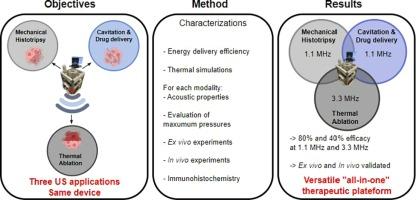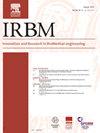Evaluation of a Multimodal Confocal Therapeutic Focused Ultrasound Apparatus: Bridging Cavitation, Thermal Ablation, and Histotripsy in Preclinical Treatments
IF 5.6
4区 医学
Q1 ENGINEERING, BIOMEDICAL
引用次数: 0
Abstract
Objectives
The development of versatile and user-friendly preclinical platforms is vital for therapeutic ultrasound research. We introduce a flexible ultrasound-guided focused ultrasound (FUS) platform with two confocal therapeutic transducers, allowing thermal and mechanical modalities, and present its design and, features, with validation of potential applications in preclinical studies.
Methods
The probe's acoustic properties, energy delivery efficiency, and thermal and mechanical modalities are characterized. A computational model predicts thermal effects while optimizing treatment parameters. Ex vivo tissue samples are used to validate system performance, safety, and usability. In vivo experiments on mice with MC38 tumors are presented with immunohistochemistry (IHC) to validate treatment outcomes.
Results
Electroacoustic conversion efficiency levels were 80% and 40% for 1.1 MHz and 3.3 MHz, respectively. Confocal therapy transducers at 1.1 MHz and 3.3 MHz successfully demonstrated cavitation histotripsy and thermal treatments. At 1.1 MHz, for histotripsy, −20 MPa negative peak pressure is achieved, while at 3.3 MHz used for thermal ablation a maximum of 35 MPa is reached for positive peak pressure. Numerical analysis provides thermal treatment planning, aligning with in vitro and in vivo experiments for lesion prediction. Real-time in vivo cavitation monitoring was consistent with in vitro chemical dosimetry, ensuring treatment uniformity.
Conclusion
The ultrasound platform induces thermal or mechanical lesions with precise spatial resolution, validated by IHC tissue characterization. Integrated cavitation monitoring enables real-time treatment monitoring. Coupling with thermal simulations provides optimization of thermal treatment parameters. This versatile “all-in-one” therapeutic platform supports multiple treatment modalities including cavitation, thermal ablation, and histotripsy, facilitating direct comparisons to assess their efficacy in diverse therapeutic settings.

评估多模式共焦治疗聚焦超声仪器:在临床前治疗中衔接空化、热消融和组织切碎术
目的开发多功能、用户友好的临床前平台对超声治疗研究至关重要。我们介绍了一种灵活的超声引导聚焦超声(FUS)平台,该平台配有两个共焦治疗换能器,允许热和机械模式,并介绍了其设计和特点,以及在临床前研究中的潜在应用验证。计算模型可预测热效应,同时优化治疗参数。体内外组织样本用于验证系统的性能、安全性和可用性。结果1.1 MHz 和 3.3 MHz 的电声转换效率水平分别为 80% 和 40%。1.1 MHz 和 3.3 MHz 的共聚焦治疗换能器成功地展示了空化组织切削术和热疗。在 1.1 MHz 频率下,组织切削可达到-20 兆帕的负峰值压力,而在 3.3 MHz 频率下,热消融可达到最大 35 兆帕的正峰值压力。数值分析提供了热处理规划,并与体外和体内病变预测实验保持一致。实时体内空化监测与体外化学剂量测定一致,确保了治疗的均匀性。集成空化监测可实现实时治疗监测。与热模拟相结合可优化热处理参数。这种多功能的 "一体化 "治疗平台支持多种治疗模式,包括空化、热消融和组织切削,便于直接比较,以评估它们在不同治疗环境中的疗效。
本文章由计算机程序翻译,如有差异,请以英文原文为准。
求助全文
约1分钟内获得全文
求助全文
来源期刊

Irbm
ENGINEERING, BIOMEDICAL-
CiteScore
10.30
自引率
4.20%
发文量
81
审稿时长
57 days
期刊介绍:
IRBM is the journal of the AGBM (Alliance for engineering in Biology an Medicine / Alliance pour le génie biologique et médical) and the SFGBM (BioMedical Engineering French Society / Société française de génie biologique médical) and the AFIB (French Association of Biomedical Engineers / Association française des ingénieurs biomédicaux).
As a vehicle of information and knowledge in the field of biomedical technologies, IRBM is devoted to fundamental as well as clinical research. Biomedical engineering and use of new technologies are the cornerstones of IRBM, providing authors and users with the latest information. Its six issues per year propose reviews (state-of-the-art and current knowledge), original articles directed at fundamental research and articles focusing on biomedical engineering. All articles are submitted to peer reviewers acting as guarantors for IRBM''s scientific and medical content. The field covered by IRBM includes all the discipline of Biomedical engineering. Thereby, the type of papers published include those that cover the technological and methodological development in:
-Physiological and Biological Signal processing (EEG, MEG, ECG…)-
Medical Image processing-
Biomechanics-
Biomaterials-
Medical Physics-
Biophysics-
Physiological and Biological Sensors-
Information technologies in healthcare-
Disability research-
Computational physiology-
…
 求助内容:
求助内容: 应助结果提醒方式:
应助结果提醒方式:


